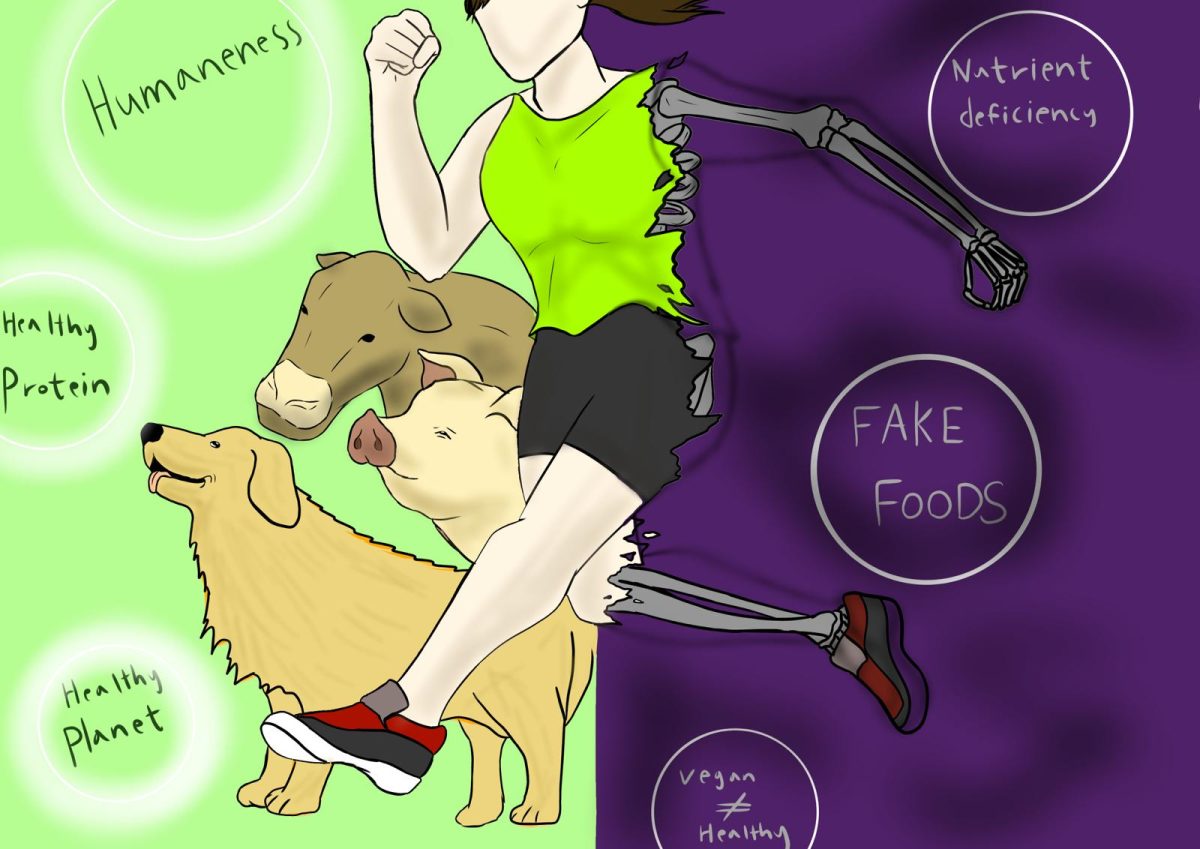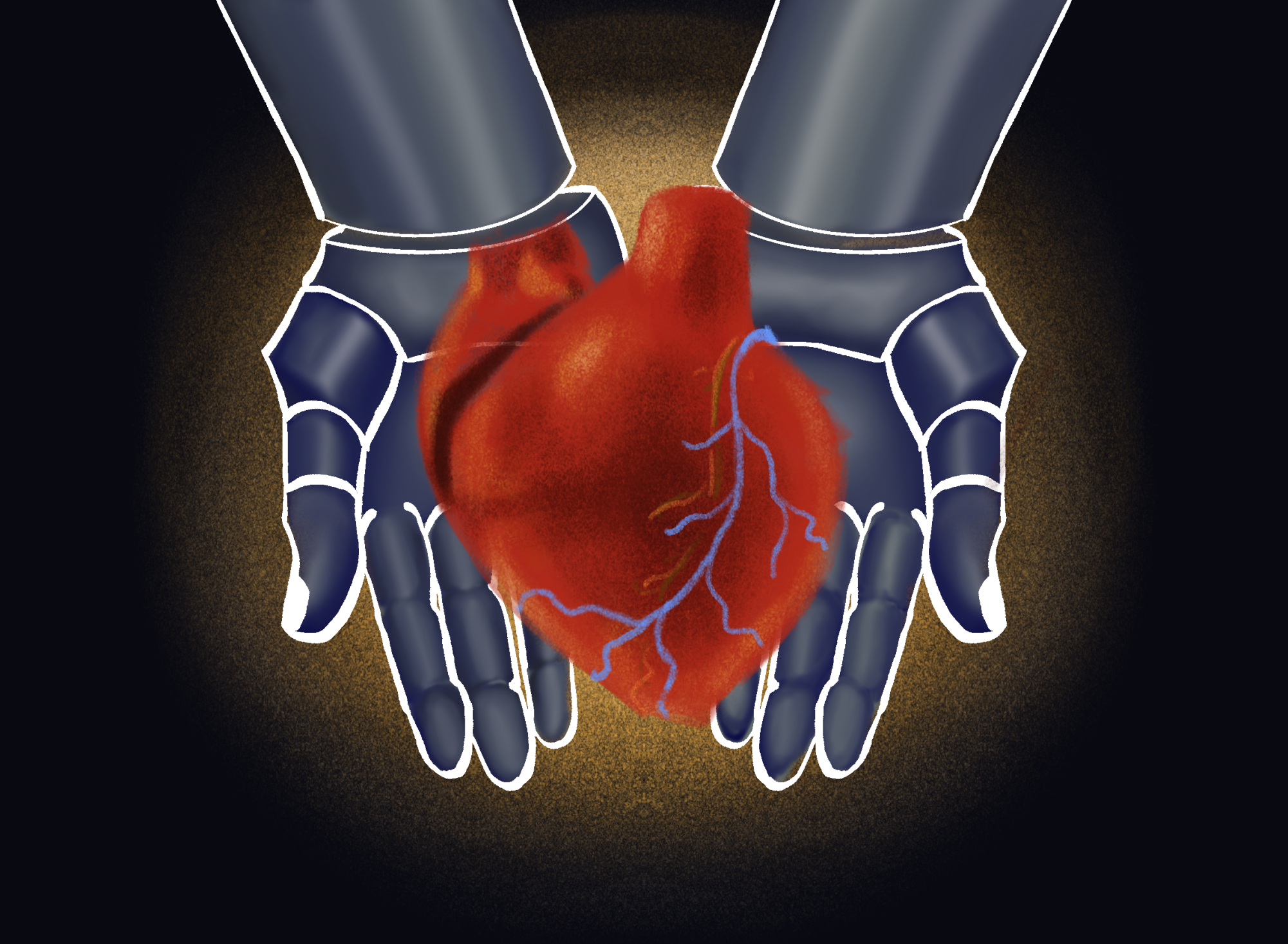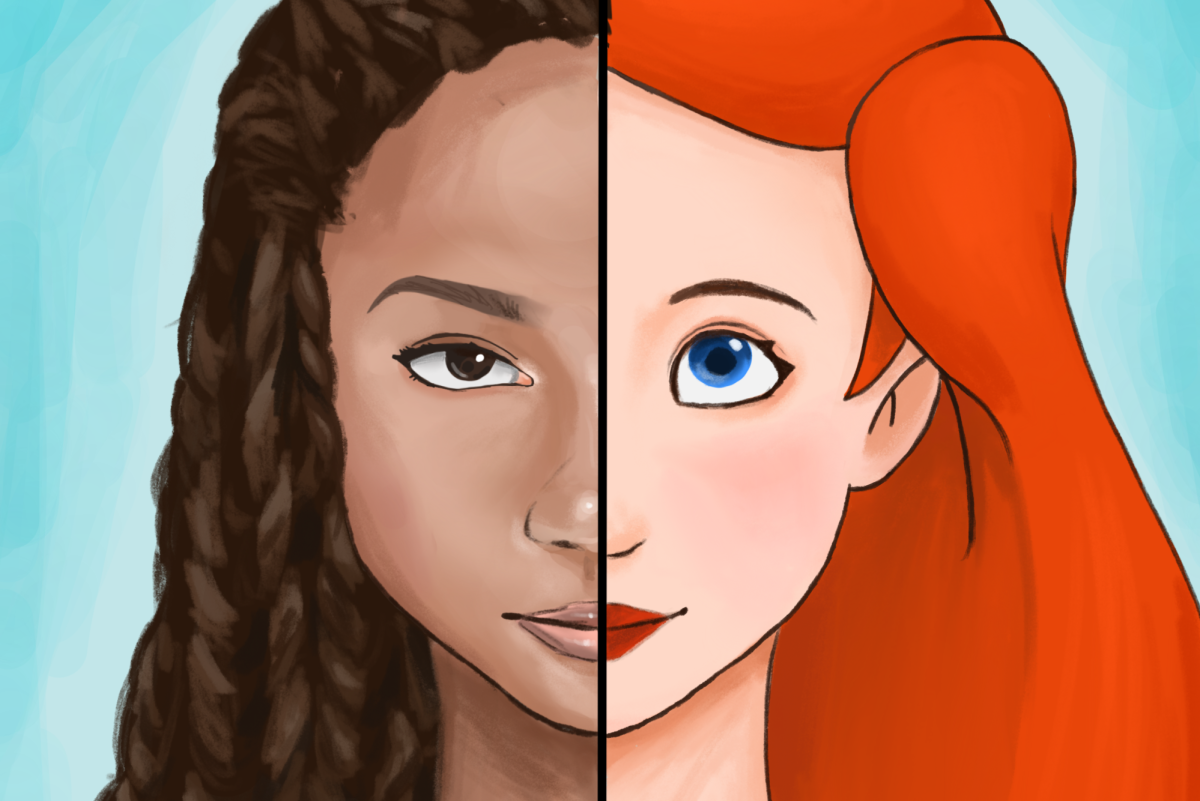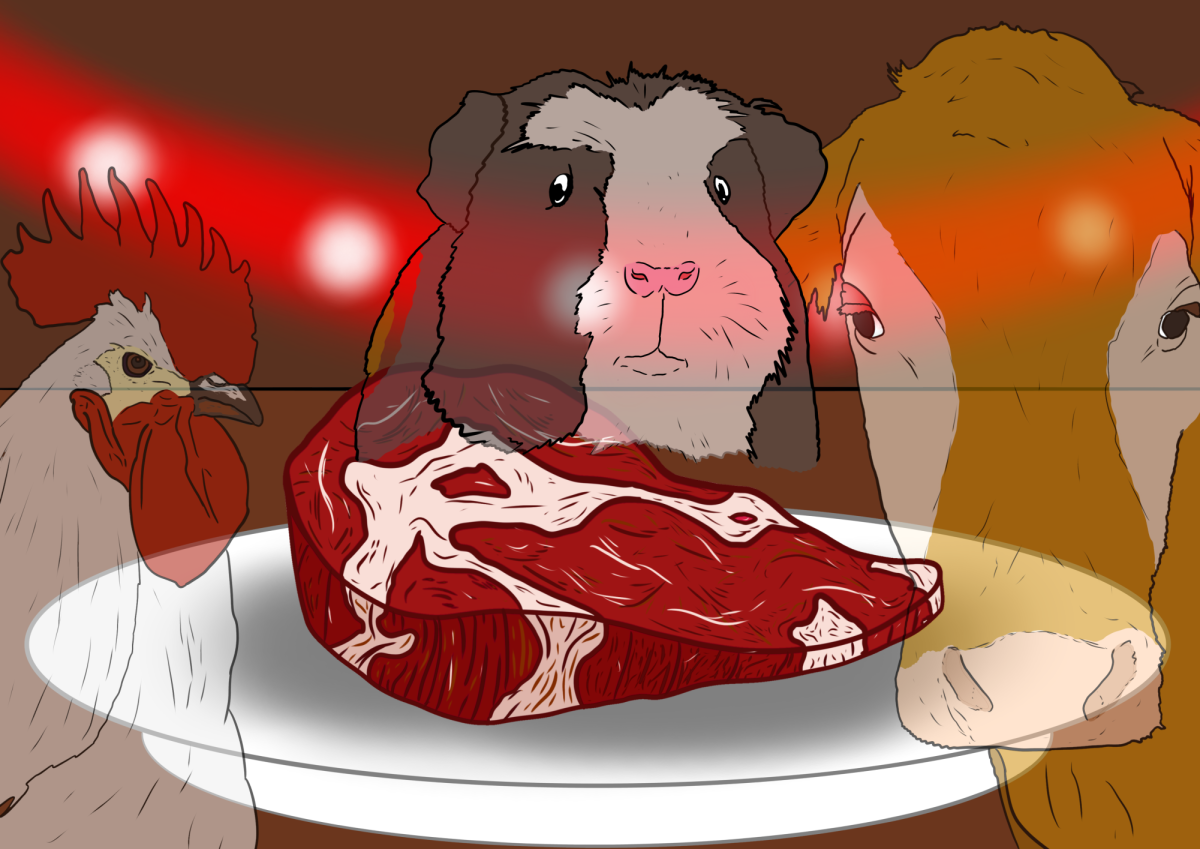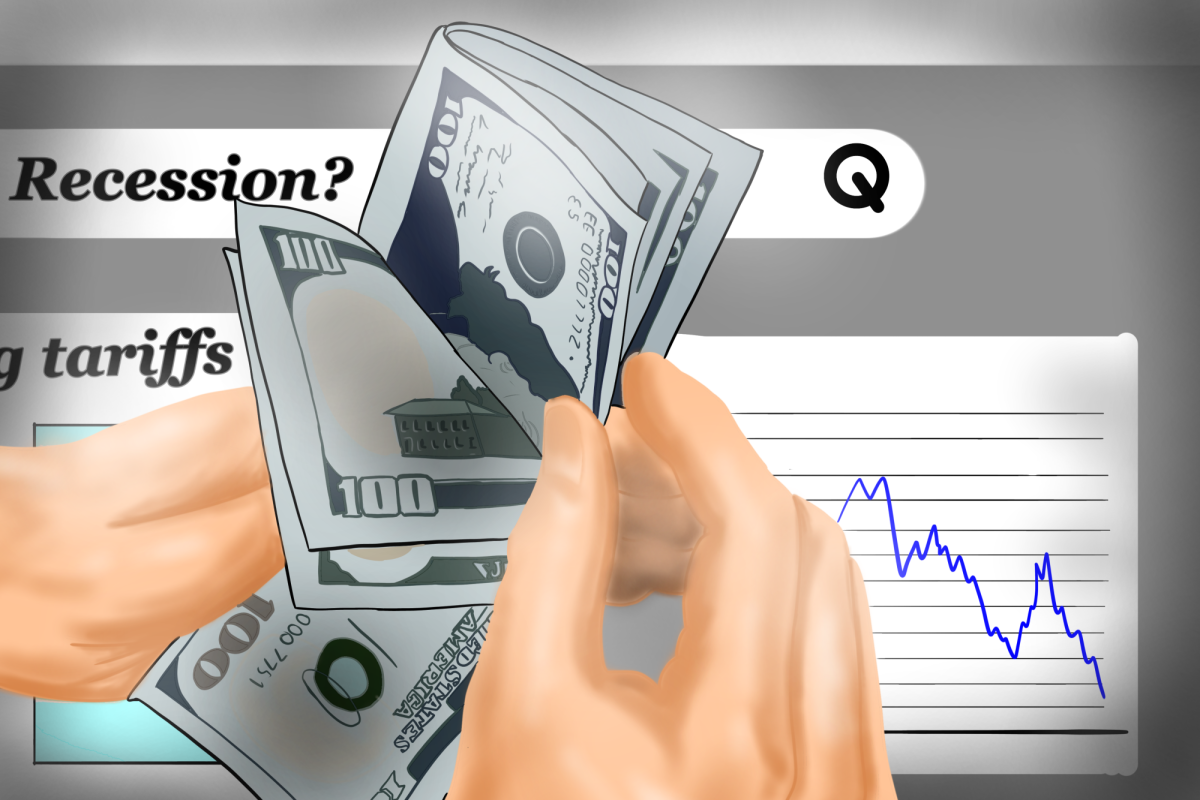Pro – by Gabrielle Gonzales
According to the Association for Psychological Science, nearly all dog owners in the United States view their dog as an important member of the family, and naturally, we would never consume a family member. So why is it that eating dogs and cats appall us but we consume cows, pigs and chickens without a second thought?
According to People for the Ethical Treatment of Animals, pigs dream, see in color, are sociable and hygienic and outperform three year-old human children on cognitive tests. This “dehumanization” of animals begins with the meat industry. The industry has faced much scrutiny, beginning in 1906 with the publication of muckraker Upton Sinclair’s The Jungle. The novel depicted the harsh conditions and unsanitary practices of the meat packing industry, and that same year, the Meat Inspection Act and the Pure Food and Drug Act were enacted to protect workers and the American diet.
While modern Americans trust meat products, they are oblivious to the corruption and inhumanity of the industry. Most recent data from the U.S. Census Bureau states that in 2019, the meat and poultry industry was valued at $227.9 billion. While the industry is regulated by the FDA, the United States Department of Agriculture and the Food Safety and Inspection Service, the operation of our country’s 3,000+ slaughterhouses is far from humane. In 2024, the American Veterinary Association created updated guidelines for the humane slaughter of animals.Three methods of stunning before slaughter include captive bolt, a device to penetrate the skull, electrical stunning and gas chambers. These processes are entirely merciless and disturbing, especially given the animal’s awareness and capacity to feel pain.
The same ethical questions arise with animal products like milk, eggs and cheese. In Farm Sanctuary, a non-profit organization that fights the effects of animal agriculture on animals, advocate Pete Paxton has “seen calves ripped from their mothers and raised on soy milk, mastitis infections tearing through the milking stalls, and calves umbilical cords still hanging from their bodies, falling down on slaughterhouse loading docks.” He describes these dairy farm cows as “inanimate objects” because they are treated with such a lack of care and respect. Some of these cows never even touch grass.
While the argument for veganism is strong, many are concerned that a plant-based diet lacks key nutrients. While eating animal products is a more accessible way to fuel your body, plant-based foods also do the job. According to Healthline, a health and wellness online powerhouse, while a vegan diet can work against heart disease and certain cancers, it can also make your body miss out on several key nutrients including vitamin B12, a nutrient involved in creating red blood cells and maintaining a healthy brain. Outside of animal products, B12 is found in soy products, nori seaweed and shiitake mushrooms. It is essential that vegetarians and vegans supplement with a vegan vitamin to ensure maximum health, an easy adjustment that makes environmental and ethical sense.
Additionally, a vegan diet is far better for the planet. Animal agriculture is responsible for 14.5% of global greenhouse gas emissions, according to the Food and Agriculture Organization of the United Nations. According to the World Health Organization, “Reducing livestock herds would also reduce emissions of methane,” the second largest contributor to global warming after carbon dioxide.
Ultimately, veganism is a lifestyle change and a new way of approaching food and compassion. If more Americans are educated on the unethical animal agriculture industry and its adverse environmental impacts, we would be a more healthy and humane planet. So skip the steak — and eat some greens.
Con – by Elsa Goodman
In recent years, veganism rocketed from a radical diet into a global movement promoting climate change, health and animal rights. Influencers promote it and companies are commercializing and profiting off the vegan lifestyle. But behind the marketing facade stands a far more complicated truth: veganism is not as ethical, sustainable or healthy as many claim.
I have been a vegetarian for nearly my entire life. I was vegan for a year; however, I quickly became vegetarian again for many reasons that I will expand on below.
Climate change is an urgent concern today, but there are better, healthier alternatives to going fully vegan to lower one’s carbon footprint. A vegetarian or pescatarian diet is healthier and less restrictive. A vegan diet requires careful attention to nutrients and followers must make sure to plan meals and ingredients.
According to an article titled “Malnutrition in Vegetarians and Vegans” by Samitivej Hospital, a leading hospital in Thailand, “92% of vegans experience vitamin B12 deficiencies, resulting in anemia, exhaustion and a greater likelihood of coronary artery disease.”
Nutrients such as vitamin B12, iron, omega-3s, and protein are notoriously challenging to get with vegan substitutes. However, what many fail to account for is that these substitutes have highly processed ingredients.
A study published in The Lancet, “Health and environmental impacts of plant-rich dietary patterns: a US prospective cohort study,” in 2022, linked long-term veganism to a higher risk of bone fracture and anemia.
Vegan does not mean healthy. The reality of many people who follow veganism is that they are replacing healthy, highly nutritional foods with ultra-processed foods full of additives.
According to the article, “How Healthy Are Fake Meats Like Impossible and Beyond, Really?” by Ali Francis on Bon Appétit, “Just because a burger is made from plants instead of animals doesn’t automatically make it ‘healthier’ for you, [Intuitive Eating counselor Kara Lydon, RD, LDN, RYT] said. ‘Compared to a meat-based burger, Beyond and Impossible contain roughly the same amount of saturated fat and more sodium,’ [Lydon] said, both of which, when over-consumed, can increase the risk of heart disease and stroke.”
Companies such as Beyond Meat and Impossible Meat are marketing their faux-meats as healthy alternatives, but in reality, they are not so much better than the real deal.
As a vegetarian, I do not support eating meat. I believe that it is morally wrong to kill animals in the great amounts that humans do for food.
According to the USDA Economic Research Service, the U.S slaughtered 34.4 million cattle in 2021, which is about 780,000 cows per week.
If everyone just ate half the amount of meat each week, humans could make such a difference, saving animals and lowering their carbon footprint.
Eggs and dairy products still contain high amounts of protein, calcium and other nutrients that support the body. Surviving on vegetables and beans is not enough. I have never been a picky eater; I would consider myself a “foodie.” When I was vegan, I was open to eating everything I could, planning out meals to guarantee maximum nutrition. However, while I ate the rainbow and made sure to get my protein in, I was malnourished. I never felt full and I lost too much weight on the extremely restrictive diet.
Although the diet did not work for me and there are many studies in support of the dangers of veganism, everybody is different. Health and nutritional needs vary and are personal for each individual; science is not perfect, and individuals must do what is best for their bodies and minds.
It is truly fascinating what today’s world has created and discovered in diets and food. We are lucky to have so many options and to live in a society with such an emphasis on nutritional health. It is important not to fall for marketing schemes within diet culture. Leading companies in veganism, along with other diets, are taking advantage of the greatly profitable potential in the industry, losing touch with the diet’s core values and humble roots.Sustainability and making a difference require more than diet trends; it requires great introspection.



